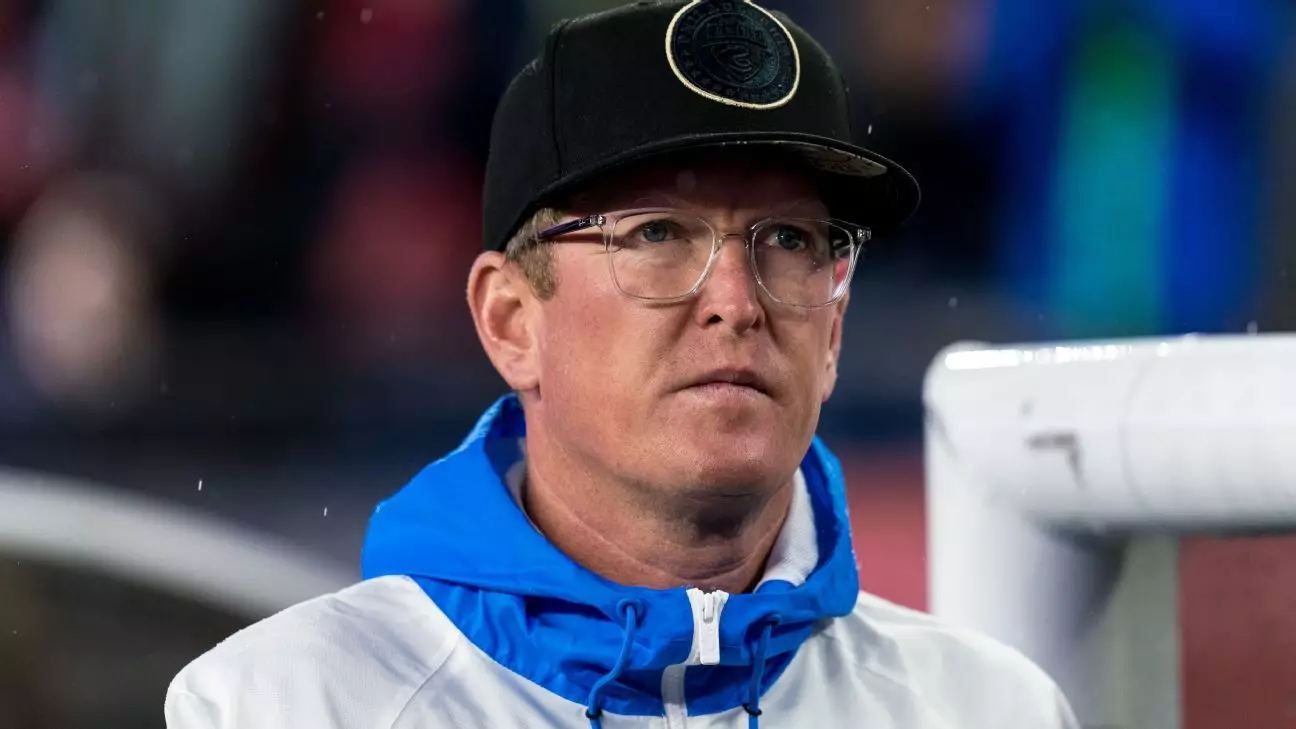On a day that rocked the foundations of Major League Soccer (MLS), the Philadelphia Union announced the departure of their long-serving manager, Jim Curtin. This news stunned not just fans and analysts but indeed many within the organization itself, echoing sentiments of shock and disbelief. Described as “blindsided” by inside sources, the abrupt removal of Curtin comes as a glaring contradiction to his largely successful 11-year management tenure, during which he firmly established himself as a beloved figure in Philadelphia soccer. A native of Oreland, PA, and a Villanova alum, Curtin wasn’t merely a manager; he was an embodiment of the club’s identity and its extensive journey in the league.
Curtin’s exit has been officially characterized as a “parting of ways.” However, reports indicate that this situation was less about mutual agreement and more about the club shifting blame following a disappointing season. The Union’s failure to secure a playoff spot for the first time since 2017 proved catastrophic, with Curtin paying the ultimate price. Within hours of being informed of the decision by sporting director Ernst Tanner, tensions escalated, culminating in Curtin leaving the meeting in frustration. As one source succinctly put it, “Somebody had to be a scapegoat, and they scapegoated Curtin.” This sentiment encapsulates a larger narrative often seen in the world of sports, where managerial changes often reflect deeper issues within organizational structure rather than the performance of an individual coach.
Curtin’s journey from the academy ranks to the managerial helm of the Philadelphia Union is a testament to his deep-rooted connection to the club. Under his leadership, the team became synonymous with resilience and innovation, cultivating a pipeline of talent through its academy that produced players like the Aaronson brothers and Mark McKenzie. Curtin’s ability to forge a cohesive team culture, coupled with his tactical acumen, led the Union to multiple finals appearances, a Supporters’ Shield, and significant progress in international tournaments.
Despite operating within financial constraints that positioned the Union as lower-tier in spending compared to its league counterparts, Curtin managed to create competitive teams that often challenged higher-budget clubs. His tenure was marked by an undeniable sense of community, resilience, and a strategic grasp of player development that infused the team with youthful energy and potential. The Union became a symbol of what could be achieved through hard work, finding success despite financial limitations.
However, the very model that positioned the Union as a beacon of hope in the league began to unravel. Relying heavily on youth development and bargain signings poses risks that were exacerbated by the unpredictable nature of talent development. The club’s struggles in the 2024 season, characterized by a lack of impact from new signings and underwhelming performances, highlighted the fragile nature of its success. The increased scrutiny fell especially on Tanner, whose recent transfer decisions appeared ill-advised and poorly executed, leaving the team vulnerable during key moments.
Curtin’s dismissal following just one subpar season raises uncomfortable questions about accountability and the long-term viability of the Union’s strategy. Critics point towards Tanner’s shifting priorities and frequent player departures as contributing factors to the club’s decline. With key players transitioning to European leagues, such as McKenzie and the Aaronsons, the loss of stability became glaringly apparent. The club had more than just a coaching change on its hands; they were facing an existential challenge amid a transformation of their roster and culture.
As the coaching staff churned and key figures departed, including former technical director Chris Albright, Curtin found himself increasingly isolated. This “brain drain” left the organization with a diluted culture and a growing chasm of mistrust. As one insider noted, a pervasive erosion of trust in the decision-making capabilities of leadership impacted the entire organization. This schism often birthed tension between Curtin and Tanner, which ultimately hindered strategic alignment.
In the eyes of many, while Curtin represented continuity and a local connection, Tanner personified the shifting dynamics of modern sports management, where short-term results often garner dismissals over long-term vision. And with the recent decisions, the future of the Union feels precarious and unstable. The management must not only find a replacement for Curtin who can replicate his history of maximizing his resources but also address larger structural issues lurking just below the surface.
Jim Curtin’s exit signals a turbulent period for the Philadelphia Union, one that challenges them to reassess their previous success and chart a sustainable path forward. His departure marks the end of an era, leaving behind a rich legacy that is difficult to replace in terms of understanding youth development, fostering talent, and embedding himself into the fabric of the team’s culture. The onus now lies with Tanner and the yet-to-be-named successor to navigate a recovery strategy that reconciles the dual imperatives of competitiveness and financial prudence.
As Curtin’s credentials remain intact, the looming question is whether the Union can recalibrate and overcome this pivotal loss without compromising the ethos that has made them a respected name in MLS. Their ability to pivot will not only determine the immediate fate of the team but may very well redefine what the future holds in the chapters to come for the Philadelphia soccer landscape.

